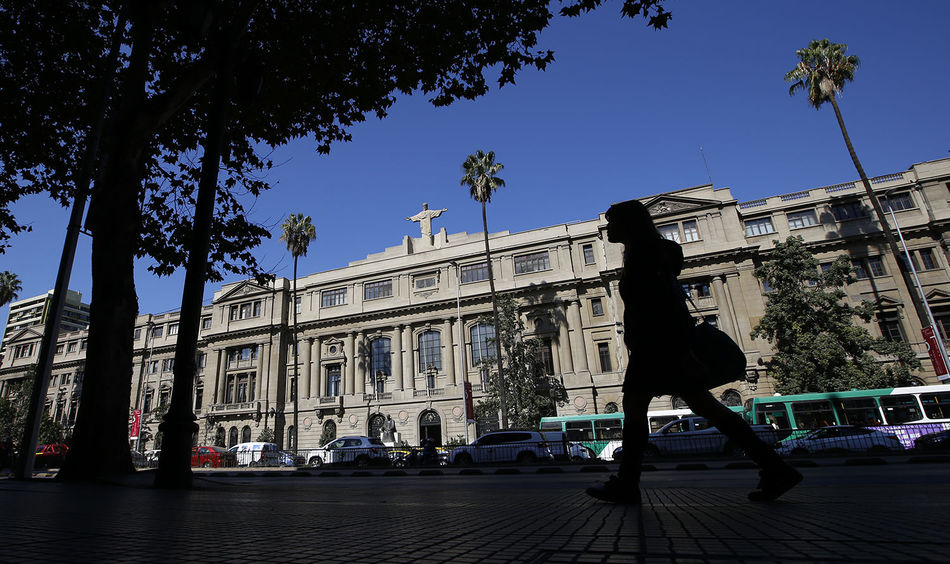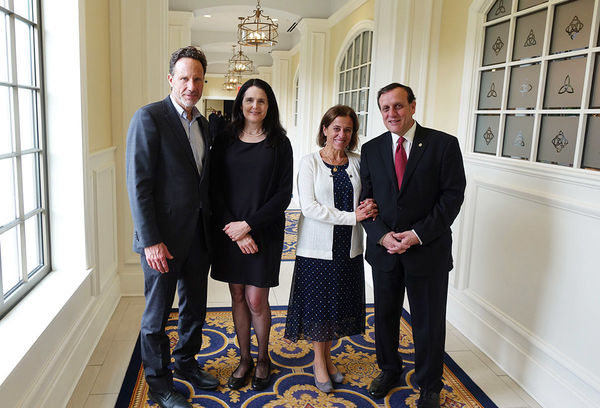Ignacio Sánchez, a pediatrician, longtime faculty member and president of Pontifical Catholic University of Chile, received an honorary degree of doctor of science at Notre Dame’s 174th University Commencement ceremony on May 19.
“It was very touching,” said Sánchez. “I was impressed by the atmosphere and the conversations. The students’ speeches were full of deep and profound messages.”
Sánchez is one of four distinguished U.S. and international leaders who were honored with a degree, along with University of Notre Dame’s Executive Vice President John Affleck-Graves and the principal speaker, Pulitzer Prize-winning columnist and renowned speechwriter, Peggy Noonan.
“Known as a wise and engaged leader who takes the time to listen despite a schedule which finds him juggling weekly patient appointments with his many other duties, he is a tireless champion of inclusion for underprivileged students and those with special needs,” said Notre Dame President Rev. John I. Jenkins during commencement.
Pontifical Catholic University of Chile (PUC) was founded in 1888 and is considered one of the top universities in Latin America. To date, it has built collaborative research and student exchanges with nearly 280 international universities from over 40 countries.
Sánchez was appointed president of PUC in 2010 and reappointed to a second term in 2015 by Pope Francis. He specializes in the study of cystic fibrosis, asthma and other respiratory illnesses in children. Previously, he served as the university’s head of pediatrics and director and dean of the School of Medicine. Sánchez is the head of the Chilean chapter of Catholic universities, a part of the International Federation of Catholic Universities.
A look back
The partnership with PUC is at the center of Notre Dame’s strategy for Latin America. The history of the University in Chile extends back three quarters of a century when the Congregation of the Holy Cross established its first educational institution in Latin America: Saint George’s College in Santiago, Chile. Saint George’s is one of Chile’s most prestigious primary and secondary schools with more than 2,600 students in attendance.
Notre Dame has continued to develop programs in Chile along with collaborations with Chilean colleagues. In the 1970s, the Kellogg Institute for International Studies and the Center for Civil and Human Rights were instrumental in finding key partners who shared Notre Dame’s goals and mission. With a shared vision to be preeminent research universities committed to both global engagement and a Catholic mission, PUC became one such partner.

Pontifical Catholic University of Chile’s Casa Central campus (in downtown Santiago)
A strategic alliance
Sánchez has played an integral part in the collaboration between PUC and Notre Dame. A new era of this mutually beneficial relationship with Sánchez started nearly a decade ago when he first visited Notre Dame’s campus in South Bend. At the time, the University was exploring ways to expand its presence in Chile to enhance faculty and research capacity.
In 2013, Sánchez signed a memorandum of understanding with Father Jenkins, strengthening scholarly engagement between both institutions. The agreement established an exchange program, encouraging faculty, doctoral students and university representatives from Notre Dame to visit, work, study, and collaborate with PUC colleagues.
“This kind of deep relationship and shared mission is very important to both students and faculty,” said Steve Reifenberg, associate professor of the practice of international development and co-director of Integration Lab at the Keough School of Global Affairs, who has had more than three decades engaging with Chile.
“Ignacio Sánchez has been a great champion of encouraging his faculty to take advantage of opportunities to come here and our own faculty and staff have been welcomed there.”

Pictured: Steve Reifenberg, Anne García-Romero, Ignacio Sánchez and his wife, Dr. Salesa Barja, following the commencement ceremony
Supporting faculty research
The faculty exchange collaboration between PUC and Notre Dame has been supported by Chilean benefactor Andrónico Luksic and his family. The Luksic Family Collaboration Grant program encourages the Notre Dame community to find new ways to collaborate with colleagues from PUC on research, exchanges, and conferences in order to increase the flow of Notre Dame faculty and staff going to Santiago. The Luksic family also supports faculty and staff from PUC to come to Notre Dame.
Anne García-Romero, associate professor in the Department of Film, Television and Theatre, was a co-recipient of a Luksic grant with her Notre Dame colleague Anton Juan, and they co-taught a Devised Performance course last fall semester at PUC’s School of Theater. She said Chile has a rich theatre tradition and spending a semester at PUC provided a remarkable collaboration between Notre Dame and PUC students.
“Our course was an extraordinary exchange of methodologies, ideas, ways of working, and knowledge in the discipline of theatre,” said García-Romero. “This valuable experience gave us a new appreciation and a deeper understanding of the legacy of Chilean theatre.”
This experience has led to an ongoing faculty exchange between the Notre Dame’s film, television and theatre department and PUC. This semester, two PUC theater faculty met with Notre Dame theater students and professors during a campus visit. Next fall, two additional PUC theater faculty will spend a week at Notre Dame, lecturing in theater classes and sharing their theater research with the Notre Dame community. García-Romero and Juan are also collaborating with the PUC School of Communications faculty on a new project as well. In addition to developing interdisciplinary research initiatives, both universities have interest in developing undergraduate and graduate exchange programs in the fields of law, mathematics, chemistry, biochemistry, physics, and biology.
Since the program’s inception in 2013, Luksic grants have funded more than 60 projects at Notre Dame, spanning five colleges, the Law School, nineteen departments, and several institutes. The program has allowed Notre Dame to dramatically expand the breadth of research and collaborative missions in Chile.
Current snapshot
Collaborative faculty research continues to be a priority for both universities, as well as growing the study abroad opportunities for students. To date, more than 30 Notre Dame faculty members from various departments, including science, law, physics, chemistry, engineering, theology, and arts & letters have traveled to Santiago to conduct research or teach. With several faculty exchange programs in the works, PUC is looking to send more faculty to Notre Dame.
While faculty research has been a focus in recent years, the study abroad program in Santiago has been established for more than twenty-five years. Operating both spring and fall semesters, the study abroad program serves approximately fifty undergraduate students from Notre Dame each year. Sánchez said these numbers are impressive and he hopes to increase these types of opportunities for PUC students to study at Notre Dame.
In 1994, Notre Dame established a permanent office in Santiago to continue supporting students, as well as facilitating relationships and supporting faculty exchanges, shared research, internships and dual Ph.D. programs. The office has since moved to PUC’s San Joaquin campus and is known as the Santiago Global Center. The programs offered or supported at the Santiago Global Center through Notre Dame International are broad and cover undergraduate and graduate students as well as opportunities for faculty and staff.
The degree of Doctor of Science honoris causa is conferred on Ignacio Sanchez, rector of The Pontificia Universidad Católica de Chile
The Catholic mission
“I think in some ways, the relationship with the Catholic University of Chile has served as an inspiring model for what Notre Dame is trying to do around world,” said Reifenberg.
Both universities share a vision for not only increasing strategic scholarly engagement, but to do so with a shared Catholic mission. Reifenberg and Sánchez both believe it’s a model that is being recognized around the world, as two universities come together with complementary perspectives and strong catholic identities as a force for good.
“With our complementary missions as premiere Catholic universities, we have to think about the value that we bring to different parts of the world,” said Sánchez.
The University recognized this partnership and storied history during commencement with the highest honor possible: an honorary degree.
“Rooted in his devotion to his family and his Catholic faith, he lives out the Gospel Call as healer and teacher,” concluded Father Jenkins.
**Originally published on international.nd.edu **
